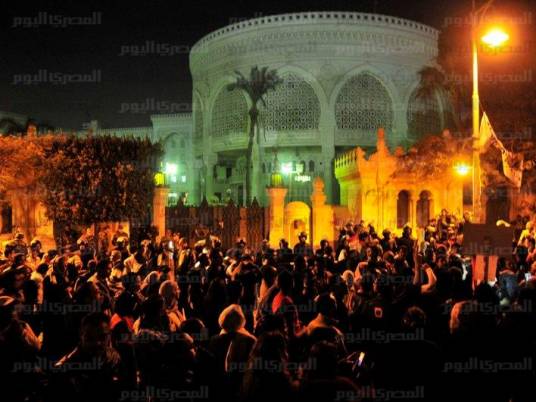
The Egyptian street has been gripped by fear and anticipation with 30 June right at the doorstep. Those feelings have been exacerbated by the tense relationship between the presidency and the Muslim Brotherhood on the one hand, and most of the opposition powers on the other. The country appears to be sliding into darkness with politics becoming more of a zero-sum game with no room for compromise. Today, each party believes only it is capable of achieving the goals of the revolution, altogether alienating the others.
It is therefore not unlikely that a fresh wave of violence will sweep across the country with protests aimed at bringing down the regime and getting rid of Brotherhood rule. This gloomy outlook is reinforced by the scenes of violence that broke out over the past two weeks, the last of which erupted in Mansoura, Sharqiya and Gharbiya and left one dead and 298 people injured.
But some past events are to blame for the current crisis, the most important of which was the Constitutional Declaration Morsy issued on 21 November. Several of the presidency's miscalculated decisions and reactions, as well as the government's slow response to the demands of the revolutionaries, have added fuel to the raging flames. On the other hand, the opposition remains incapable of providing a viable alternative and continues to react to the angry crowds on the streets rather than being an initiator of action. The opposition has failed to present solid platforms, even though it accuses the regime of losing its sense of direction.
The Brotherhood, the Islamist current — the Jama’a al-Islamiya and Salafi currents, excluding the Nour Party — and the presidency describe the opposition’s calls for early presidential elections as nonsense and see them as an attempt to overthrow a legitimate regime and abort the Islamist project for the sake of secular, liberal and leftist currents. This view of the protests renders the conflict one centred on religion as well as on politics.
The protest staged by Islamist currents in Rabea al-Adaweya Square on 21 June provides evidence of their rejection of the president’s resignation and of violence.
Therefore, the resignation of the president is out of the question for Islamists and the call for early elections unacceptable in principle. Meanwhile, the opposition have set early elections as their primary condition, deepening the rift and warning of confrontation and violence, with opposition powers expected to vent their anger in violent acts targeting some institutions such as the presidential palace, cabinet of ministers or the Shura Council headquarters.
The opposition's rejection of dialogue with the presidency on the second anniversary of the revolution — which is partially attributed to the lack of mutual confidence — is actually more to blame than the presidency. Despite the spate of violence flaring across the country, the opposition does not seem to be ready to make compromises particularly if the crowds of proesters support their demands. The current state of mobilisation, the tensions and feelings of alienation stoked by some politicians, preachers and the media from both sides have rendered 30 June a zero-sum game with one side having to wipe out the other.
Some of the opposition have described 30 June as a decisive day, one that will put an end to the “rule of the Supreme Guide of the Brotherhood.” Some Islamic preachers have meanwhile said that joining protests to call for Morsy's ouster is forbidden, that defying Morsy's rule is an act of disbelief and that this rebellion would be a rebellion against Islam and the Islamic project.
The current state of affairs points to the likelihood of clashes on 30 June, particularly with the police not quite back on its feet even if we hear that the state of preparedness has been heightened and plans are in place for the demonstrations. It remains worrying that the police have not coordinated efforts with the military to contain outbreaks of violence nor has it specified places for the opposition's protests and others for pro-regime rallies, which warns of confrontation if saboteurs infiltrate the charged crowds.
The piece is a translated summary of an analysis by Al-Masry Studies and Information Center.




